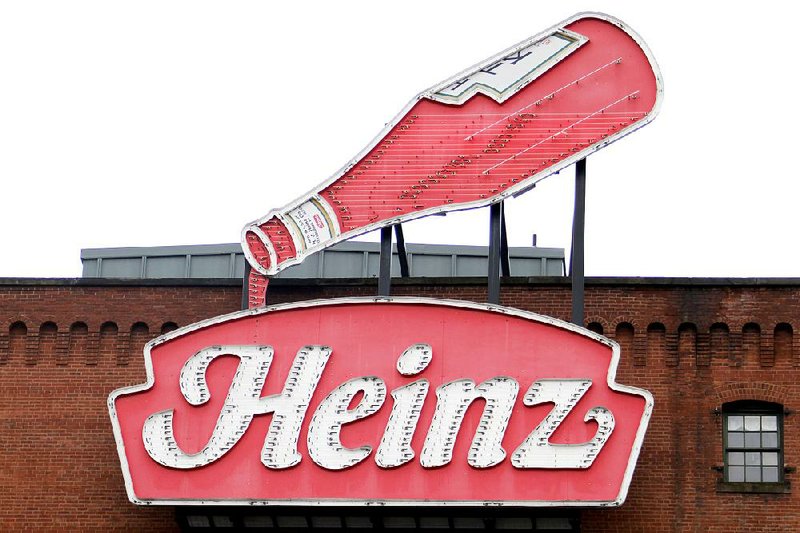NEW YORK -- Plans by H.J. Heinz Co. to buy Kraft Foods will put some of the most familiar names in pickles, cheese, hot dogs and other packaged foods under the same company umbrella.
The deal, which still needs approval by federal regulators and shareholders of Kraft Foods Group Inc., was announced Wednesday. It would pull together an array of brands, including Heinz ketchup, Oscar Mayer lunch meats, Jell-O desserts and Miracle Whip spreads, creating one of the world's largest food and beverage companies.
The combination of the two companies -- each more than a century old -- was engineered by Warren Buffett's Berkshire Hathaway and Brazilian investment firm 3G Capital. Although shoppers are not expected to see any big changes as a result, the creation of the Kraft Heinz Co. reflects the pressures facing some of the biggest packaged-food makers in the U.S.
Berkshire and 3G will invest $10 billion in the deal, which values Kraft at about $46 billion, before net debt, based on its stock price Tuesday.
The deal also marks a return to megadeals for Buffett, who has maintained that he is on the hunt for "elephants" -- large companies he could incorporate into the growing Berkshire Hathaway conglomerate.
Companies that include Campbell Soup, General Mills and Kellogg have been lowering costs or striking deals intended to refresh their products as shoppers migrate away from longtime pantry staples in favor of options marketed as less-processed.
The Heinz-Kraft deal is in many ways just the latest example of that, although Buffett noted that the two companies still have a strong base of customers.
"I think the tastes Kraft and Heinz appeal to are pretty enduring," he said in a telephone call to the business news channel CNBC.
Early plans outlined by Kraft and Heinz executives in a conference call Wednesday focused largely on the cost efficiencies that would be achieved through the deal, rather than the potential for sales growth in North America. They said they expect to save $1.5 billion through moves such as combining manufacturing and distribution networks, as well as using the newly created company's scale to negotiate better prices for ingredients.
The boards of both companies unanimously approved the deal.
If the deal is approved, Kraft is expected to undergo cost-cutting under the management of 3G Capital, which teamed up with Berkshire Hathaway two years ago to buy Heinz.
"3G has squeezed a lot out of Heinz, and now they will do the same job at Kraft," said David Turner, an analyst at research firm Mintel. "When Buffett invests in a sector, it gives a sign that the sector is ripe for acquisitions. This will flag up other opportunities."
John Cahill, chief executive officer of Kraft, said the new management would drive a "much leaner organization," as was the case when 3G took over Heinz. He said 3G can "make this happen deeper and faster."
In Arkansas, Kraft employs about 360 people at the company's Planters plant in Fort Smith and about 110 at a sales office in Rogers, said spokesman Joyce Hodel.
"It is too early to speculate on any details," Hodel said. "It is business as usual until the transaction closes, which we expect to happen in the second half of 2015."
Heinz doesn't have any manufacturing facilities in Arkansas, said spokesman Michael Mullen. The company does have an office in Bentonville.
The two companies see potential in pushing their products more aggressively overseas. Although Kraft's sales are focused in North America, executives noted that its brands are well-known in major markets around the world. Already, Heinz gets 61 percent of sales from outside North America, said Bernardo Hees, the CEO of Heinz who will become head of the newly created company.
The deal came together rapidly, Buffett said, after being in the works for only about four weeks. The new company will have its headquarters in Pittsburgh, where Heinz is based, and in the Chicago area, home of Kraft, and will have annual revenue of about $28 billion, he said.
Eight of its brands have annual sales of $1 billion or more, and five others log sales between $500 million and $1 billion every year.
There are plans for at least four new products this year, Buffett said, and there is a lot of freedom to sell the company's products outside the U.S. and Canada.
Since splitting from Mondelez International Inc. in 2012, Kraft's business has been primarily concentrated in the U.S. and Canada. All of its manufacturing capacity is in those two countries, according to the company's annual report.
Kraft's stock shot up $21.85, or 36 percent, to close Wednesday at $83.17.
The total value of the deal is difficult to gauge because Heinz is privately held. But Kraft shareholders will receive stock in the combined company and a special cash dividend of approximately $10 billion, or $16.50 per share. Each share of Kraft will be converted into one share of Kraft Heinz.
Current Heinz shareholders will own 51 percent of the combined company, with Kraft shareholders owning a 49 percent stake.
The Kraft-Heinz board will consist of six directors from the current Heinz board. Three of those six will be members from Berkshire Hathaway and three will be from 3G Capital. The current Kraft board will appoint five directors to the combined company's board.
Kraft-Heinz plans to keep Kraft's current dividend once the transaction closes. Kraft has no plans to change its dividend before the deal is completed.
Information for this article was contributed by Michelle Chapman and Candice Choi of The Associated Press; by Brian Fanney of The Arkansas Democrat-Gazette; by David Gelles of The New York Times; and by Craig Giammona and Matthew Boyle of Bloomberg News.
Business on 03/26/2015

